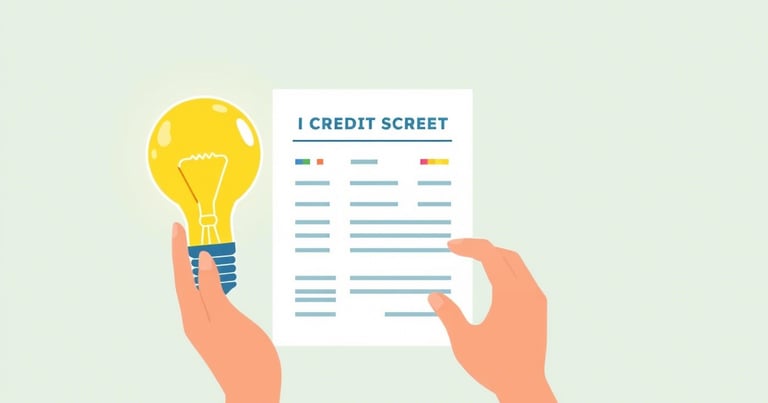Understanding Credit Scores: What They Are and How to Improve Yours
Your credit score is one of the most important numbers in your financial life. It can affect whether you qualify for a loan, how much interest you’ll pay, what kind of apartment you can rent, and even whether you can get a job in some industries. Yet, many people don’t understand how credit scores work or how to improve them. This article will break down everything you need to know about credit scores—what they are, how they’re calculated, why they matter, and what steps you can take to boost yours.
5/23/20253 min read
What Is a Credit Score?
A credit score is a three-digit number that represents your creditworthiness. Lenders use it to assess how likely you are to repay borrowed money. The score is calculated based on your credit history, including your payment habits, the amount of debt you carry, and how long you’ve had credit.
The most commonly used scoring models are FICO and VantageScore, both of which range from 300 to 850. The higher your score, the more trustworthy you appear to lenders.
Credit Score Ranges
Understanding what different scores mean is essential. Here's a general breakdown of FICO score ranges:
Excellent (800–850): Exceptional credit history, lowest interest rates.
Very Good (740–799): Above average; usually qualifies for great rates.
Good (670–739): Average score; eligible for most loans but may not get the best rates.
Fair (580–669): Below average; higher interest rates and stricter lending terms.
Poor (300–579): Often denied credit or approved with very high interest.
What Affects Your Credit Score?
Different credit scoring models weigh various factors slightly differently, but here are the general components of a FICO score:
Payment History (35%)
This is the most important factor. Consistently making payments on time is crucial. Late payments, defaults, or collections will significantly hurt your score.Amounts Owed (30%)
This refers to your credit utilization ratio—the amount of credit you’re using compared to your total available credit. Ideally, you should keep this below 30%.Length of Credit History (15%)
The longer your credit accounts have been open, the better. Lenders like to see a history of responsible use over time.Credit Mix (10%)
Having a variety of credit types—credit cards, installment loans, mortgages—can improve your score.New Credit (10%)
Opening several new credit accounts in a short time can lower your score, especially if they involve hard inquiries.
Why Your Credit Score Matters
Your credit score can impact many areas of your life:
Loan Approvals and Interest Rates: A higher score makes it easier to qualify and get lower interest rates.
Credit Card Access: Better scores offer access to premium cards with rewards and benefits.
Housing Opportunities: Landlords often check credit before approving rental applications.
Employment: Some employers, especially in finance, may review credit reports.
Insurance Premiums: Insurers may use credit information to determine rates.
How to Check Your Credit Score
You can check your credit score in several ways:
Credit Card Providers: Many offer free credit scores to customers.
Credit Bureaus: Equifax, Experian, and TransUnion offer paid and free options.
Financial Apps: Platforms like Credit Karma or NerdWallet provide free access and monitoring.
Tips to Improve Your Credit Score
Improving your score takes time and discipline. Here’s what you can do:
1. Pay Bills on Time
Late or missed payments hurt the most. Automate payments or set reminders to never miss a due date.
2. Lower Your Credit Utilization
Try to use less than 30% of your available credit limit. If your total limit is $10,000, keep balances below $3,000.
3. Avoid Opening Too Many Accounts
Each new credit application results in a hard inquiry. Too many inquiries in a short time can lower your score.
4. Keep Old Accounts Open
Even if you don’t use them, older accounts help lengthen your credit history and improve your score.
5. Diversify Your Credit
If you only have a credit card, consider taking a small personal loan and paying it off on time to show a healthy credit mix.
6. Check for Errors
Review your credit reports regularly. Mistakes like incorrect balances or missed payments can be disputed and removed.
Common Credit Myths
Let’s debunk a few misconceptions:
Checking your own credit hurts your score.
False. This is a “soft” inquiry and has no effect.Closing credit cards improves your score.
Not always. It can actually hurt your credit utilization and shorten your credit history.Carrying a small balance helps your score.
No. It's better to pay off your balance in full each month.
How Long Does It Take to Improve a Credit Score?
There’s no instant fix. Depending on your current situation, improving your score can take anywhere from a few months to several years. For example, recovering from a late payment might take a few months, but rebuilding after bankruptcy could take up to a decade.
Consistency is key. The longer you follow good credit habits, the more your score will improve.
Final Thoughts
Your credit score is more than just a number; it’s a reflection of your financial behavior. Understanding what influences your score and taking proactive steps to maintain or improve it can save you thousands of dollars in interest and open up better financial opportunities.
No matter where you start, small consistent changes—like paying on time and reducing debt—can lead to big results. Make it a priority to monitor your score, understand how it works, and build a strategy for long-term financial health.

